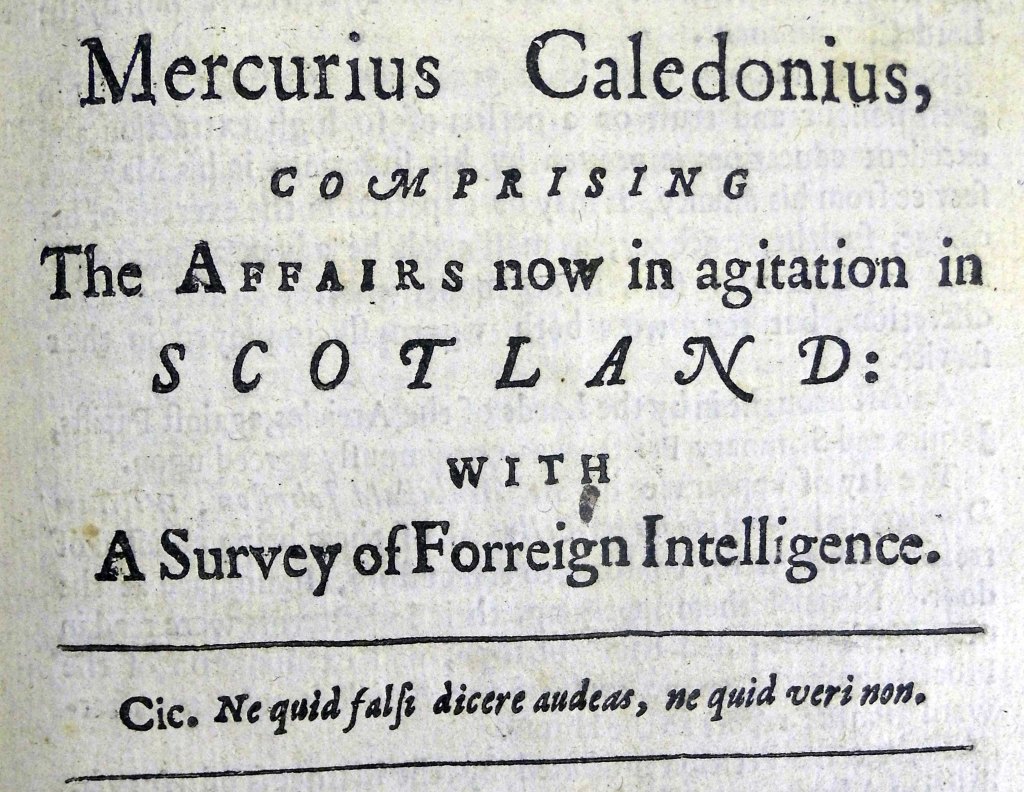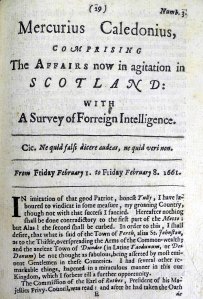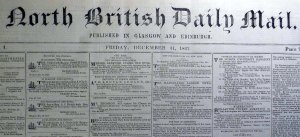The University’s Development and Alumni Office is staging a panel debate on 4 March examining the future of printed media. The panel – to be chaired by journalist and broadcaster Andrew Neil – will consider the current trends in digital consumption and explore the opportunities and threats created by increased consumer internet usage via mobile devices. In support of the event we have decided to explore how some of today’s burning issues (on press regulation and the impact of technology on the press) were mirrored in earlier times by focussing on a couple of early ‘print media’ items held in Special Collections: Scotland’s first ever newspaper, the Mercurius Caledonius and Scotland’s first every daily newspaper, the North British Daily Mail.
The Mercurius Caledonius was first published on 31 December 1660 and weekly thereafter until suppressed in late March 1661. On first examination, it is not like any newspaper familiar to modern eyes. It doesn’t have the big headlines, the broadsheet pages, the columns or the pictures. Rather it follows the “newsbook” format established (at first on the continent and later in England) over the previous half century: short, unillustrated quarto pamphlets, densely packed with small text. Yet, there is something surprisingly modern and journalistic sounding in the promise of its motto: Ne quid falsi dicere audeas, ne quid veri non – To assert no falsehood and to hide no truth. It has been argued that it was impossible for the newspaper to emerge as a medium before people enjoyed a certain freedom of speech and with this motto and its reticence to ignore hypocrisy and abuse of power regardless of faction or faith, the Mercurius Caledonius arguably moved beyond the partisan English newsbooks of the past.
The Mercurius was edited by Thomas Sydserf, an Edinburgh-based playwright and son of the Bishop of Galloway. While much of the content covered juicy morsels of foreign news (e.g. the Duke of Modena’s new grain tax, or the King of Spain’s recovery from illness), it also reported up-to-date Scottish news. It was published during a turbulent period – the monarchy had recently been re-established and Scotland’s restoration settlement saw power being removed from the covenanters and Kirk elders and returned to the aristocracy and the bishops. As a royalist, and the son of a bishop, Sydserf was undoubtedly approving of the change yet this didn’t stop him being (subtly) critical of some prelates and aristocrats. It was perhaps this unwillingness to toe-the-line that eventually led to the title being suppressed – it is certainly evident that Sydserf made some powerful enemies! The Mercurius’s motto makes its first appearance in the sixth issue after James Sharp (soon to be appointed Archbishop of St Andrews) took offence at being written about. Implicitly referring to Sharp’s angry reaction and subsequent attempt to silence him Sydserf comments:
“I have laboured to vindicate in some measure my Groaning country, though not with the success I fancied. Hereafter nothing shall be done contradictory to the first part of the Motto: but Alas! The second shall be curbed”
Evidently he didn’t curb his instincts quite enough since – possibly on the orders of the King himself! – the Mercurius was suppressed. Appositely, given the upcoming panel debate, it has recently been re-launched, motto and all, as “Scotland’s first truly online newspaper” which “seeks to revive Scottish journalism by using the Internet rather than railing against it”.
If the Mercurius was Scotland’s first newspaper, Scots would have to wait nearly 200 years before the first daily arrived. The North British Daily Mail (later to become the Daily Record!) which was launched in 1847 undoubtedly owed its existence to Victorian technology. This type of daily operation was simply not possible before mechanised printers enabled rapid mass production and the railway network offered timely distribution. With no direct rail link yet built between England and Scotland, the paper’s editor received the latest London news in a surprising way: the London dailies were delivered by train as far as Carlisle before being relayed to Glasgow by a series of four rapid horseback messengers, timed with chronometer. In this way, the latest national and international news was delivered to Scottish readers’ breakfast tables every single morning – something truly unimaginable just 50 years before.
The seismic impact a mass-audience daily press made is perhaps best described in a letter of 1831 by the French politician and writer Alphonse de Lamartine which, in some ways, echoes some of the contemporary rhetoric surrounding the Internet:
“Before this century shall have run out, Journalism will be the whole press – the whole human thought. Since that prodigious multiplication art has given to speech – to be multiplied a thousand-fold yet – mankind will write their book day by day, hour by hour, page by page. Thought will spread abroad in the world with the rapidity of light; instantly conceived, instantly written, instantly understood, at the extremities of the earth, it will speed from pole to pole. … The only book possible from to-day is a Newspaper.”
While much of what Lamartine says sounds eerily prescient, he was certainly wrong about the newspaper eclipsing the book. If you’d like to hear the panel’s thoughts on whether the print media will be quite so fortunate in the face of 21st-century technology, book your place at the debate now!
Categories: Library, Special Collections



 Johnny Beattie: ‘The Clown Prince of Scotland’
Johnny Beattie: ‘The Clown Prince of Scotland’  Visualizing Collation in the Hunterian Manuscript Collection
Visualizing Collation in the Hunterian Manuscript Collection  ASC Rewind: The expression of the emotions in man and animals
ASC Rewind: The expression of the emotions in man and animals  ASC Rewind: Apocalypse
ASC Rewind: Apocalypse
I was looking for some new techniques about printing press during that search i got your post its really interesting.
Glad you found it interesting. Thanks for the comment!
Reblogged this on Cardmon's Blog and commented:
Should be a good debate, which I could be there.